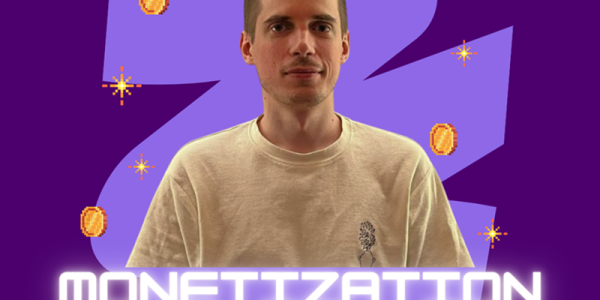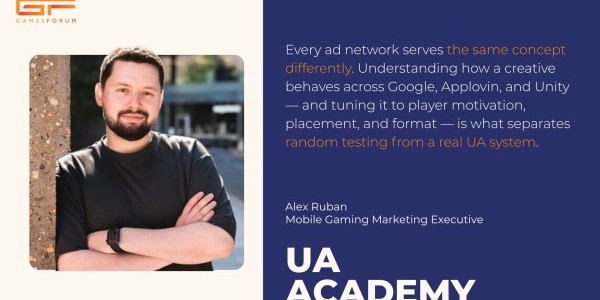Gamesforum Meets: Otto Simola, Head of Ad Monetization, Fingersoft

Josh Vowles: Hi Otto, for the first question also, tell us a bit about yourself!
Otto Simola: My name is Otto. I work at Fingersoft as Head of Game Economy and that's my working title. In my personal life I’m a drummer and a bicycle enthusiast.
When it comes to work, I've been working at Fingersoft for 7 years. Pretty much exactly 7 years now, and I started as a software engineer. Then ended up in our live ops team and started doing our live ops events and that's in that stage when everything was new. We were creating the technology around it.
I was kind of like the end user, the simulated end user who was doing the events, planning them, and if there were issues with our tech I could little bit solve them by myself, and report them on the technical level.
At the same time I ended up working with the ad networks and SDKs and that's how I ended up being interested in ads, and how they are implemented and what placements. And I started also, since I’m a gamer by myself, I started playing very casual games. I'm not a hardcore gamer. I'm really the super Mario guy, a Nintendo fan boy, and playing like casual games on Mobile. And from there I got interested in how the ads are actually implemented in other games, and started wondering about those. And then all of a sudden, I was given this opportunity to do jump on the business side of things, and I pretty much exactly 4 years ago I became an ad monetization manager.
And then I started managing things. I was doing that all alone, and I decided at some point during the infamous 2020 that I have to have a team, that I can't handle it all. I was still doing some SDK stuff, and I was handling the external communication, and so on. And it was like really exhausting during the staying at home alone and doing those. So I decided I had to have a team around me, and I got the team. I built the team, and now we got two people working with me and a technical person who was handling the SDK stuff, and another one who was helping me with the setups.
And then I ended up from like the beginning of this year I have the title Head of Game Economy, which is a team lead role, and we unified our like IAP and ad monetization actions together.
So that is in a nutshell how my history is at Fingersoft!
Josh Vowles: When you're not Head of Game Economy, what can people find you doing?
Otto Simola: Mostly at the moment people find me at the ice hockey rings because my daughter is playing ice hockey, and I spend quite a lot of time with the team and helping the team. Helping make it possible for kids to play ice hockey.
And then I like bicycling. I'm the kind of like the local bicycle guy, who is like very interested in the city development and all that kind of things.
Also, I've been playing drums and music overall, since I was a kid. We don't have a band, well, we have kind of a band. But it is more older guys who just enjoy playing, and we play cover songs and have a couple of our own songs. It is just for fun. Every week on Sundays we go there and play. So that's something that I have had like 15 years now. A tradition to go on Sunday and play.
Josh Vowles: Head of Game Economy, is quite a unique title. Has your role focused, or refocused to looking more at hybrid monetization when it comes to mobile games?
Otto Simola: Yes, exactly. The idea of how we created, we call it game economy team. As I said, it's a team lead role for the whole team, and this is when I started at Fingersoft, I think I was like the twenty-second employee at the company, so very small. And then we started growing, and now we have 110 employees, still relatively small, but growing quite fast in the past couple of years.
So, we have this separate IAP team, which was part of the Live Ops team and then we had the one-person ad mon team.
And then we started growing the ad mon team and noticed that hey, we are actually on the monetization system overlapping things and that maybe we should see how many things are overlapping. For example, on the design process, seeing what is overlapping, and what we could do together to better it.
Then we ended up like forming a new team which was called game economy. I understand that the Head of Game Economy, the word is a little bit weird, and it is more internal language. I have been thinking if I can call myself Head of Ad Monetization in like external talk.
But the historical reason for this is that we have been talking about IAP monetization. We have been talking about all the monetization, and then we have had ad monetization. So, we didn't want to use the same term internally that refers only to IAP side of things, so that that's why we ended up coming up with a new title, which is pretty much that what we think about.
But most of the game industry people think about like game economy itself is a little bit different, but they are tied to this monetization side of things.
Josh Vowles: Monetization of a legacy game like Hill Climb Racing must be a learning curve. What advice do you have for anyone out there is working on a similar legacy title?
Otto Simola: Exactly, it is a learning curve, those who already work with the legacy title, I would say that you know that there's no, not a single trick that you can keep it up and going.
And to be honest, we don't exactly know how a title becomes an evergreen title like Hill Climb Racing is, and how it manages to keep like all the time the install rates and everything. We haven't done any UA for Hill Climb Racing one ever. It's been always completely organic, and how we have managed to keep it that way.
So, I would say that there are a lot of factors that we very early on other there in the stores and then in some areas it became a cult, so to say that it is so big that it's like the first application that people install on their devices. So, it's very hard to get that with any kind of UA or kind of buying of that success over there.
So, it's more like a long-term process like you are just doing the daily tasks and developing the game and think about what we could add to the game, so that people would enjoy the game after like 2 years, 3 years. Not how we would milk out everything from the game in the next quarter.
So, this long-term thinking has been always at Fingersoft the main reason that we have seen success.
I mean we haven't, but we could have changed. There are always people saying that, hey, you have this and that amount of money coming from the game like you could make more revenue by doing this and that to those things. And then it's like, yeah, we could. But then we wouldn't have our players anymore. So, we don't want to milk it out in the short time, combining thinking long term, with still doing those everyday tasks so that we would keep the quality up in a game, and at the same time preserving that what’s unique in the game.
We wouldn't change the core mechanics too much, even though, for example in Hill Climb Racing One, we know that the games internal game economy is bad. We have been saying that this is not good, but we cannot take it back anymore. It's something that we have to live with and we have to monetize that somehow.
It’s rewarding for the players that they enjoy playing the game because they feel that they get so much from the game. They don't actually have to spend that much. They spend time, and they watch ads. But it's not in a sense competitive, but more relaxed, and when we cannot make Hill Climb Racing One all of a sudden more competitive.
Of course, we can make other Hill Climb Racing titles more competitive, but in the sense that those games they kind of like the course, should be kept pretty much the same as it is.
Josh Vowles: Having seen Hill Climb Racing One grow in the last seven years, what are your top 3 lessons from running monetization on Hill Climb Racing? What would you do differently?
Otto Simola: The good thing about running the monetization on Hill Climb Racing games is that if I would like to do something differently we can do, in the sense that we have a very good and talented team on Hill Climb Racing One, and Hill Climb Racing Two so that we can, if we want to steer the game to some direction it is possible you had.
Like in my team, we had to be quite patient to wait for the other tasks running in big teams, and in big teams in a sense that they have certain roadmaps to follow. But when we get things through, we have a monetization team here that says, here are the options that you could do to make the game better, and they usually say, hey, it's nice to have someone that comes to tell us what we can do, and they pick the ideas and start improving.
In that sense we can make also the difference, and all the time develop and come up with new ideas for the game.
So, in lessons I have learnt, I would say be brave. I've been saying on many occasions that the developers should be more brave in experimenting with new things.
We have tried new things, and if playing Hill Climb Racing One, you see very whacky things in the game, and we have tried weird things and if the feedbacks been very bad, we can change it back, if we don't break the whole game! So, in that sense, even though I said don't break the core, you have to try out new things, and I’d be saying also that you can apologize later on and take it back.
I would say also, that to learn from the experiments and experiences in a game is good, but also we shouldn’t stick to the old rules, saying yeah, this worked 7 years ago, for example. The industry is very different now. People don't hate that much like for us, let's say, interstitial ads, or ads overall. With in 10 years, they have become a part of mobile games in a sense that people even expect that there are rewarded videos in their mobile games. If it's like a casual type of game, users are not very annoyed with some interstitials or some intrusive ads. Maybe that’s something that was like very bad for retention 7 years ago. But it can be now that it’s okay for the for the users, and they are used to seeing them.
The industry is so different, and we shouldn't only stick to the past like, hey we just kind of do this in this game, because we have done it before. So be brave and try out new things.
And also I would like to say that kind of like finding the identity of how we would like to work, and how we would like to look outside the company, in a sense, and building the brand of what we are, and that's also very important that we have this with Hill Climb Racing brand, which is kind of unique, and there are certain things that kind of like reflect off like what the developers are.
They are like little bit crazy things, but they're also nice things in the sense that that it's not like evil. You can say that when you're playing this it is not trying to be evil to me. But there is more humour and it's not that serious. In a sense, that reflects what we are as a company, or how the developers feel and want to be so that's kind of like reflecting the identity in the game.
Josh Vowles: What can our audience expect from your presentation at Gamesforum Hamburg?
Otto Simola: Yeah, that's interesting, my current plan now is to give a glimpse and tiny view on the monetization history of the Hill Climb Racing games. I would like to give some ups and downs and learnings, good and bad, and some little bits that are more ugly, maybe.
But how we have survived also from those dips and going forward with the title and the sequels and everything, and I would hopefully like to show at least a tiny bit of something about our upcoming projects with Lego Hill Climb Adventures and Hill Climb Racing Three if I can.
Catch Otto this year at Gamesforum Hamburg on 14-15 June. To book your tickets click here.











